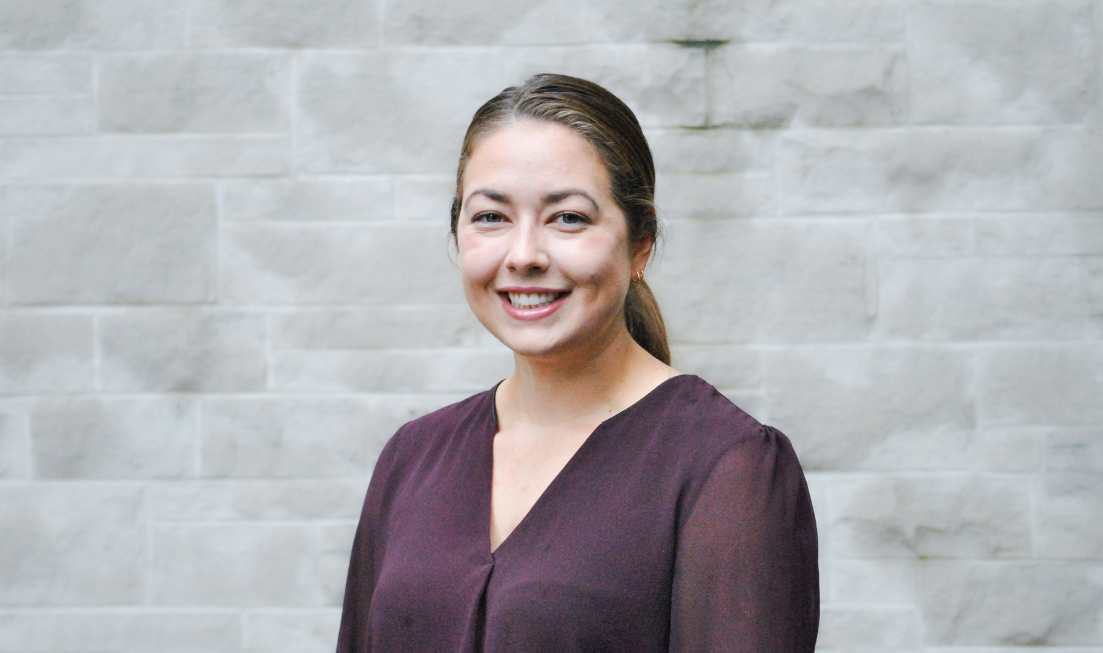Mac grad Rebecca Correia is creating a better future for Canada’s seniors

McMaster PhD Rebecca Correia put her doctoral scholarship to good use, working to improve access to health systems and community-based care for older adults.
BY Kara Aaserud
January 23, 2025
Canada’s seniors deserve quality care — but with fewer than 400 geriatricians across the country, increasing demands on family physicians and a rapidly aging population, the system is struggling to keep up. Rebecca Correia, a recent PhD graduate from McMaster University’s Health Research Methodology program, is working to change that.
Correia’s research focuses on family doctors with “Care of the Elderly” certification or a specialized practice approach to deliver better care to older adults. This training enables physicians to bridge critical gaps in senior care — for example, by proactively managing chronic conditions to prevent unnecessary hospital visits.
Correia’s work is supported by McMaster’s Centre for Health Economics and Policy Analysis (CHEPA), a world leader in advancing equitable and effective health systems.
In 2023, CHEPA co-founders David Feeny and George Torrance made a philanthropic gift to establish a doctoral research scholarship to support emerging scholars who are addressing critical health-care challenges. Their gift inspired further contributions from the CHEPA community.
In 2024, Correia became the scholarship’s first recipient, marking a major milestone in her career.
The scholarship allowed Correia to focus on her research, which was published in Canadian Family Physician, and to collaborate with organizations such as the College of Family Physicians of Canada and the Institute for Clinical Evaluative Sciences (ICES).
Now a postdoctoral fellow at Dalhousie University, she continues to advocate for equitable, effective health care for seniors, ensuring they can enjoy a better quality of life.
Correia shares how the CHEPA Doctoral Research Scholarship helped shape her journey and work.
How has this scholarship supported your research?
The CHEPA scholarship gave me the resources and opportunities I needed to focus on my research. I worked with the College of Family Physicians of Canada and ICES to study how family doctors with “Care of the Elderly” certification influence patient outcomes, practice locations and care delivery.
What I found is that these physicians provide comprehensive medical services with a special focus on addressing the unique needs of older patients.
I also led a study to develop standards for measuring and improving community-based care quality for seniors. The goal was to evaluate the quality of care by comparing practice differences among family physicians, which can help health system planners better match services to the needs of aging populations.
What was it like to receive the inaugural CHEPA Doctoral Research Scholarship?
It was truly an honour. During my time at McMaster, I was inspired by CHEPA scholars like David Feeny and George Torrance, whose work has had such a huge impact on health systems research. Receiving this award affirmed the importance of what I’ve been doing and strengthened my resolve to make a real difference in health care.
It also came with a strong sense of responsibility. As I wrap up my doctoral studies and move into postdoctoral training, I’m more driven than ever to push for evidence-based policies that build fair and sustainable health systems. My passion for senior care comes from personal experience — seeing the struggles of older family members opened my eyes to the need for change.
What impact has this recognition had on your journey?
The scholarship reinforced my commitment to doing interdisciplinary, collaborative research. CHEPA’s focus on equity inspired me to dig into ways we can reduce disparities in access to care, particularly for underserved groups. For instance, my doctoral research looked at how “Care of the Elderly” physicians can improve care delivery in areas that need it most.
On a personal level, being recognized gave me a sense of pride and motivation. It encouraged me to aim higher — not just as a researcher, but also as a leader and advocate for innovation in health policy.
What’s next for your research and career?
I’ve started a postdoctoral fellowship at Dalhousie University. My goal is to study aging populations across four Canadian provinces and examine demands on the family physician workforce. Our goal is to help workforce planners address gaps in care.
This work combines quantitative and qualitative methods to assess practice patterns and disparities in access, ultimately helping to develop models and tools that guide health system planning.
The connections I made through CHEPA, including the McMaster Institute for Research on Aging (MIRA) and the Collaborative for Health and Aging, have prepared me for this next chapter.
I’m now working toward securing an independent faculty position so I can keep pushing forward with research that improves primary care for aging Canadians.
What do you hope your research will contribute to health policy?
I hope my work helps create a primary care system that is fairer and more effective for seniors.
By providing evidence-based tools and data, my research aims to guide health planners in addressing gaps in care and improving access for aging Canadians.
For example, my postdoctoral project includes interviews with health-care providers to identify barriers to equitable care and develop strategies to overcome them.
What message do you have for donors and future scholarship recipients?
To donors: Thank you for believing in the next generation of health policy leaders. Your support has made a real difference in my ability to pursue meaningful research.
To future recipients: The CHEPA scholarship is so much more than financial support — it’s an investment in your potential. Make the most of the mentorship and collaboration opportunities that CHEPA provides. Together, we can create solutions to complex health system challenges and work toward a more equitable future.


